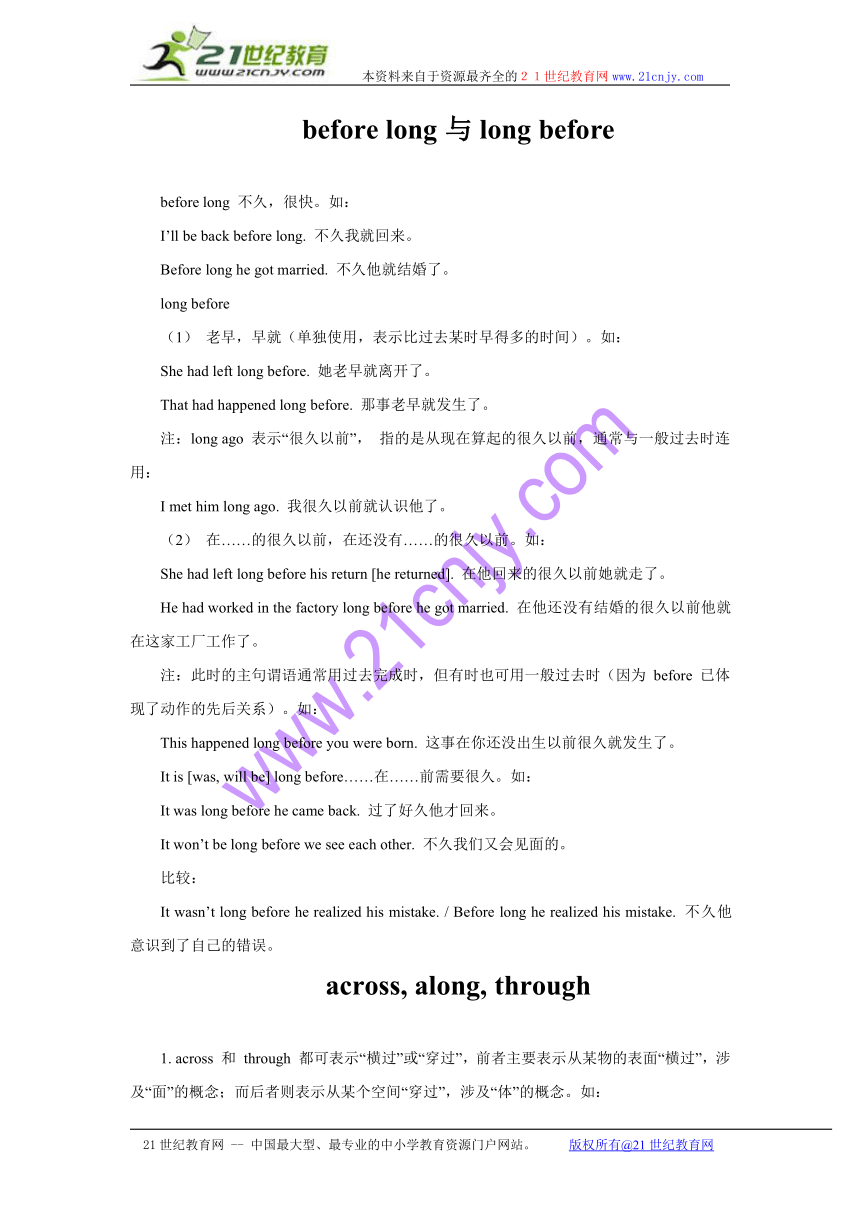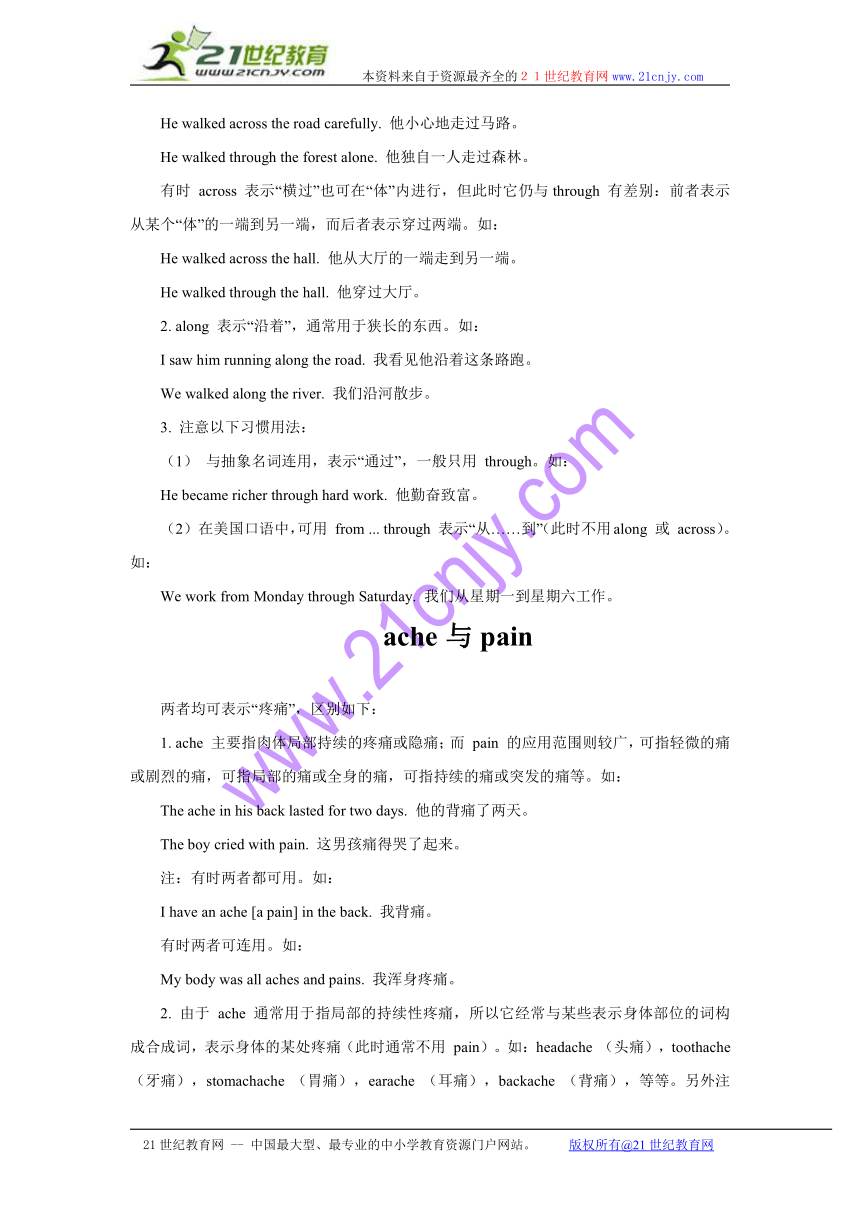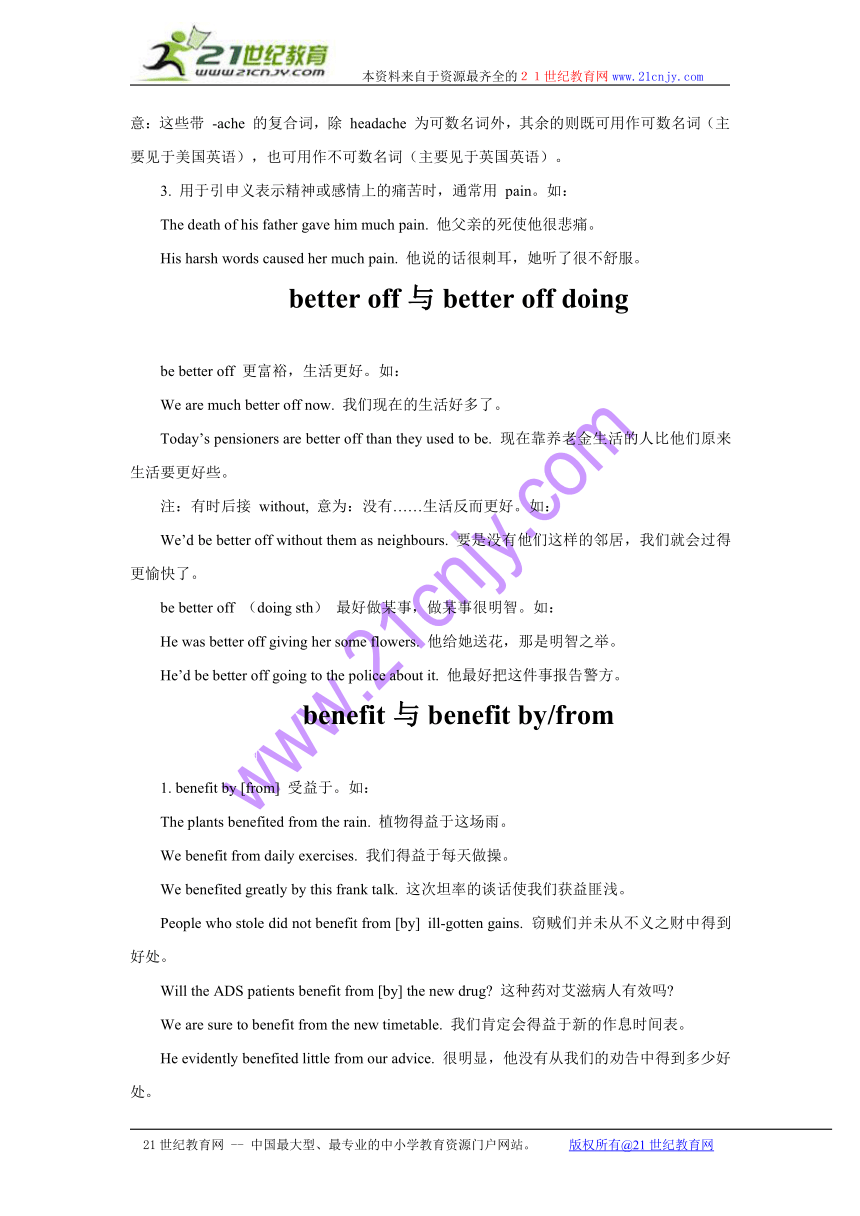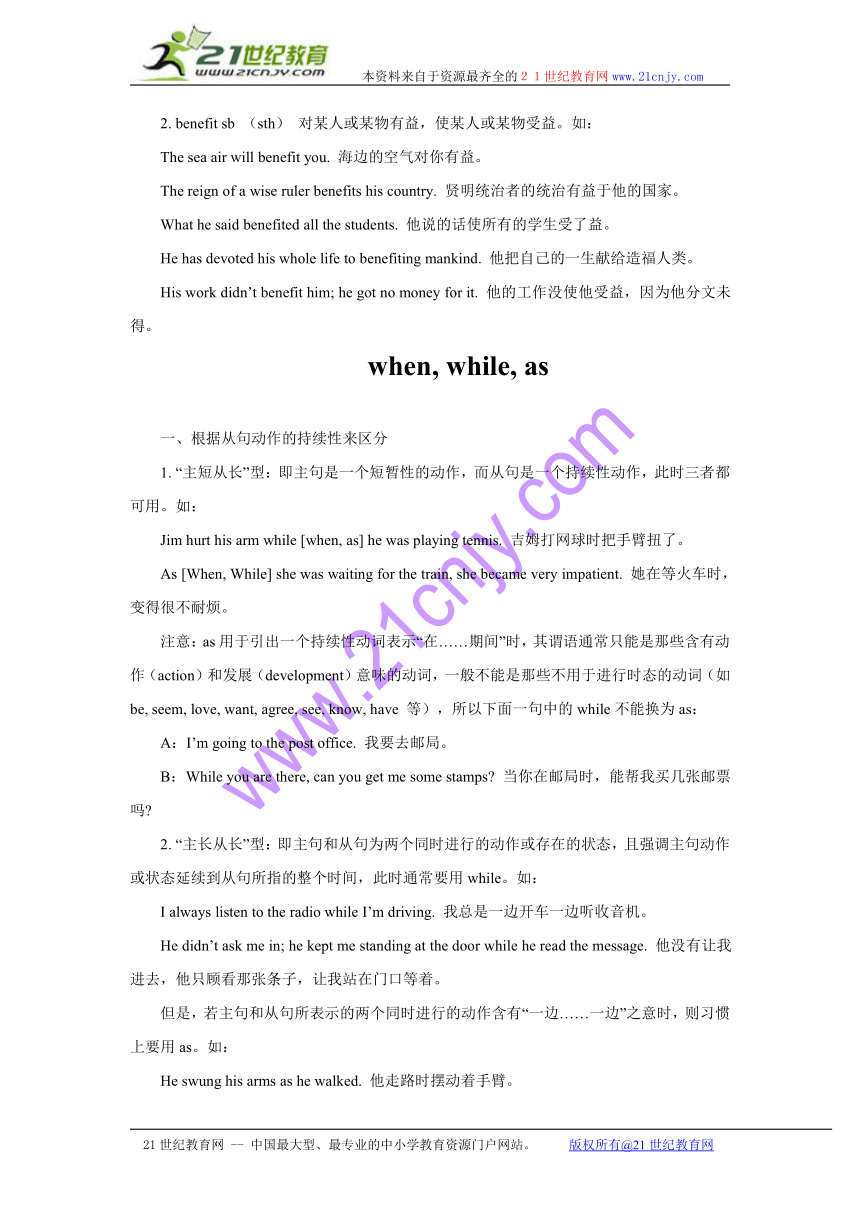高中英语词语辨析(一)
图片预览




文档简介
本资料来自于资源最齐全的21世纪教育网www.21cnjy.com
before long与long before
before long 不久,很快。如:
I’ll be back高考资源网 before long. 不久我就回来。
Before long he got married. 不久他就结婚了。
long before 21世纪教育网
(1) 老早,早就(单独使用,表示比过去某时早得多的时间)。如:
She had left long before. 她老早就离开了。
That had happened long before. 那事老早就发生了。
注:long ago 表示“很久以前”,指的是从现在算起的很久以前,通常与一般过去时连用:21世纪教育网
I met him long ago. 我很久以前就认识他了。
(2) 在……的很久以前,在还没有……的很久以前。如:
She had left long before his return [he returned]. 在他回来的很久以前她就走了。
He had worked in the factory long before he got married. 在他还没有结婚的很久以前他就在这家工厂工作了。
注:此时的主句谓语通常用过去完成时,但有时也可用一般过去时(因为 before 已体现了动作的先后关系)。如:
This happened long before you were born. 这事在你还没出生以前很久就发生了。
It is [was, will be] long before……在……前需要很久。如:
It was long before he came back. 过了好久他才回来。
It won’t be long before we see each other. 不久我们又会见面的。
比较:
It wasn’t long before he realized his mistake. / Before long he realized his mistake. 不久他意识到了自己的错误。21世纪教育网
across, along, through
1. across 和 through 都可表示“横过”或“穿过”,前者主要表示从某物的表面“横过”,涉及“面”的概念;而后者则表示从某个空间“穿过”,涉及“体”的概念。如:
He walked across the road carefully. 他小心地走过马路。
He walked through the forest alone. 他独自一人走过森林。
有时 across 表示“横过”也可在“体”内进行,但此时它仍与through 有差别:前者表示从某个“体”的一端到另一端,而后者表示穿过两端。如:21世纪教育网
He walked across the hall. 他从大厅的一端走到另一端。
He walked through the hall. 他穿过大厅。
2. along 表示“沿着”,通常用于狭长的东西。如:
I saw him running along the road. 我看见他沿着这条路跑。
We walked along the river. 我们沿河散步。
3. 注意以下习惯用法:
(1) 与抽象名词连用,表示“通过”,一般只用 through。如:
He became richer through hard work. 他勤奋致富。
(2) 在美国口语中,可用 from ... through 表示“从……到”(此时不用along 或 across)。如:
We work from Monday through Saturday. 我们从星期一到星期六工作。
ache与pain
两者均可表示“疼痛”,区别如下:21世纪教育网
1. ache 主要指肉体局部持续的疼痛或隐痛;而 pain 的应用范围则较广,可指轻微的痛或剧烈的痛,可指局部的痛或全身的痛,可指持续的痛或突发的痛等。如:
The ache in his back lasted for two days. 他的背痛了两天。
The boy cried with pain. 这男孩痛得哭了起来。
注:有时两者都可用。如:
I have an ache [a pain] in the back. 我背痛。
有时两者可连用。如:
My body was all aches and pains. 我浑身疼痛。
2. 由于 ache 通常用于指局部的持续性疼痛,所以它经常与某些表示身体部位的词构成合成词,表示身体的某处疼痛(此时通常不用 pain)。如:headache (头痛),toothache (牙痛),stomachache (胃痛),earache (耳痛),backache (背痛),等等。另外注意:这些带 -ache 的复合词,除 headache 为可数名词外,其余的则既可用作可数名词(主要见于美国英语),也可用作不可数名词(主要见于英国英语)。21世纪教育网
3. 用于引申义表示精神或感情上的痛苦时,通常用 pain。如:
The death of his father gave him much pain. 他父亲的死使他很悲痛。
His harsh words caused her much pain. 他说的话很刺耳,她听了很不舒服。
better off与better off doing
be better off 更富裕,生活更好。如:
We are much better off now. 我们现在的生活好多了。
Today’s pensioners are better off than they used to be. 现在靠养老金生活的人比他们原来生活要更好些。
注:有时后接 without, 意为:没有……生活反而更好。如:
We’d be better off without them as neighbours. 要是没有他们这样的邻居,我们就会过得更愉快了。
be better off (doing sth) 最好做某事,做某事很明智。如:
He was better off giving her some flowers. 他给她送花,那是明智之举。
He’d be better off going to the police about it. 他最好把这件事报告警方。
benefit与benefit by/from
21世纪教育网
1. benefit by [from] 受益于。如:
The plants benefited from the rain. 植物得益于这场雨。
We benefit from daily exercises. 我们得益于每天做操。
We benefited greatly by this frank talk. 这次坦率的谈话使我们获益匪浅。
People who stole did not benefit from [by]ill-gotten gains. 窃贼们并未从不义之财中得到好处。21世纪教育网
Will the ADS patients benefit from [by] the new drug 这种药对艾滋病人有效吗
We are sure to benefit from the new timetable. 我们肯定会得益于新的作息时间表。
He evidently benefited little from our advice. 很明显,他没有从我们的劝告中得到多少好处。
2. benefit sb (sth) 对某人或某物有益,使某人或某物受益。如:
The sea air will benefit you. 海边的空气对你有益。
The reign of a wise ruler benefits his country. 贤明统治者的统治有益于他的国家。
What he said benefited all the students. 他说的话使所有的学生受了益。
He has devoted his whole life to benefiting mankind. 他把自己的一生献给造福人类。
His work didn’t benefit him; he got no money for it. 他的工作没使他受益,因为他分文未得。
when, while, as
一、根据从句动作的持续性来区分21世纪教育网
1. “主短从长”型:即主句是一个短暂性的动作,而从句是一个持续性动作,此时三者都可用。如:
Jim hurt his arm while [when, as] he was playing tennis. 吉姆打网球时把手臂扭了。
As [When, While] she was waiting for the train, she became very impatient. 她在等火车时,变得很不耐烦。
注意:as用于引出一个持续性动词表示“在……期间”时,其谓语通常只能是那些含有动作(action)和发展(development)意味的动词,一般不能是那些不用于进行时态的动词(如be, seem, love, want, agree, see, know, have 等),所以下面一句中的while不能换为as:
A:I’m going to the post office. 我要去邮局。
B:While you are there, can you get me some stamps 当你在邮局时,能帮我买几张邮票吗
2. “主长从长”型:即主句和从句为两个同时进行的动作或存在的状态,且强调主句动作或状态延续到从句所指的整个时间,此时通常要用while。如:
I always listen to the radio while I’m driving. 我总是一边开车一边听收音机。
He didn’t ask me in; he kept me standing at the door while he read the message. 他没有让我进去,他只顾看那张条子,让我站在门口等着。
但是,若主句和从句所表示的两个同时进行的动作含有“一边……一边”之意时,则习惯上要用as。如:21世纪教育网
He swung his arms as he walked. 他走路时摆动着手臂。
I couldn’t remember a story to tell the children, so I made one up as I went along. 我想不出有什么故事可给孩子讲了,只好现编现讲。
3. “主长从短”型:即主句是一个持续性动作,而从句是一个短暂性动作,此时可以用as或when,但不能用while。如:
It was raining hard when [as] we arrived. 我们到达时正下着大雨。
When [As] he came in, I was listening to the radio. 他进来时,我在听收音机。
二、根据主句与从句动作是否同时发生来区分
1. 若主句与从句表示的是两个同时发生的短暂性动作,含有类似汉语“一……就”的意思,英语一般要用as (也可用when)。如:
The ice cracked as [when] I stepped onto it. 我一踩冰就裂了。
He jumped to his feet as the boss came in. 老板一进来他立刻站了起来。
但是,在hardly [scarcely]…when…句式中,不能将when换成as。如:
Scarcely had we arrived, when it began to rain. 我们刚一到就下起雨来了。
2. 若主句与从句表示的是两个几乎同时发生的短暂性动作,含有类似汉语“刚要……就”“正要……却”的意思,英语一般要用as(也可用when),且此时通常连用副词just。如:
I caught him just when [as] he was leaving the building. 他正要离开大楼的时候,我把他截住了。21世纪教育网
Just as [when] the two men were leaving, a message arrived. 就在这两个人要离开的时候,突然有了消息。
三、根据是否具有伴随变化来区分
若要表示主句动作伴随从句动作同时发展变化,有类似汉语“随着”的意思,英语习惯上要用as,而不用when或while。如:
The room grew colder as the fire burnt down. 随着炉火逐渐减弱,房间越来越冷。
As time goes by my memory seems to get worse. 随着时间的流逝,我的记忆力似乎越来越差。
注:若不是引导从句,而是引出一个短语,则用with,不用as。如:
With winter coming on, it’s time to buy warm clothes. 随着冬天到来,该买暖和衣裳了。
The shadows lengthened with the approach of sunset. 随着太阳下落,影子也逐渐伸长。
四、根据从句动作的规律性来区分21世纪教育网
若暗示一种规律性,表示“每当……的时候”,英语一般要用when。如:
It’s cold when it snows. 下雪时天冷。
He smiles when you praise him. 你夸奖他时他总是笑笑。
五、根据主从句动作的先后顺序来区分
若主句与从句所表示的动作不是同时发生,而是有先后顺序时,一般要用when。如:
When he arrives he’ll tell us all about the match. 等他到了,他会好好给我们讲讲那场比赛的情况。
When she had finished she waited as though for a reply. 她讲完之后等了等,仿佛是在等候回答似的。
六、根据是否具有“趁机”意味来区分
1. 若从句所表示的“当……的时候”具有“趁机”的意味,则通常用while。如:
Strike while the iron is hot. 趁热打铁。21世纪教育网
I tried to slip the note to him while the teacher wasn’t looking. 我想趁老师不注意时把条子偷偷递给他。
有时也用when。如:
He stole the money when no one was by. 他趁旁边无人时把钱偷走了。
The boy looks at her repeatedly when she’s not looking. 那男孩趁她没看他的时候不断地盯着她看。
七、根据是否用作并列连词来区分
when可用作并列连词,表示“这时(突然)”;while也可以用作并列连词,表示“而”“却”(表示对比);但as则没有类似用法。如:
I was just about to go to bed when I heard a knock on the door. 我正要睡觉,听见有人敲门。
One person may like to spend his vacation at the seashore, while another may prefer the mountains. 一个人会喜欢在海滨度假,而另一个人会喜欢在山里度假。
八、根据所引出的省略句来区分
1. as和when之后均可直接跟一个名词,构成省略句;但是while一般不这样用。如:
As [When] a boy, he lived in Japan. 他小时候在日本。21世纪教育网
As [When] still a student, he wrote a novel. 当他还是个学生的时候,他就写了一本小说。
2. when和while之后可接现在分词、介词短语、形容词等构成省略句,但as一般不这样用。如:
When [While] reading, he fell asleep. 他看书时睡着了。
When [While] in trouble, ask her for help. 遇到麻烦的时候你就去找她帮忙。
You must study hard while (you are) young, or you will regret when (you are) old. 你趁年轻时必须努力学习,不然到老了你会后悔的。
unless与if ... not
两者都可表示否定的条件,有时可换用。如:
Come tomorrow unless I phone [if I don’t phone]. 要是我没有打电话,明天就来。
You won’t catch the train unless you hurry [if you don’t hurry]. 你要是不赶快,你就赶不上火车了。
但是在下列情况下,通常要用 if ... not 而不用 unless:
1. 当所述条件要引出一种新的想法或情况(而不是结束已存在的想法或状态)时。如:
I’ll be angry if I’m not invited to the party. 如果不邀请我参加晚会,我会生气的。(即“不邀请我去参加晚会”会导致一种新情况——“我会生气”)
I will be surprised if he doesn’t have an accident. 他要是不出事,我倒感到奇怪了。(即“他不出事”会导致一种新情况——“我感到奇怪”) 21世纪教育网
2. 当要引出一个表示假想的(imaginary)条件句时。如:
If he weren’t so silly, he would understand. 他要不是那样傻的话,他就会明白了。(实际上他很傻)
If I hadn’t stopped her, she would have jumped down. 要不是我阻止了她,她就跳下去了。(实际上我阻止了她)
注:偶尔可见到 unless 用于假想条件句,但有不少语法家反对这一用法,建议学生不要模仿。顺便说一句,unless 有时用于引出一个补充前言的话(此时通常用破折号而不用逗号且不能用 if ... not 替换),此时若谈论的是过去的情况,注意不要与表示想象的条件句相混淆。如:21世纪教育网
I couldn’t have got to the meeting on time — unless I had caught an earlier train. 我不可能及时赶到会场,除非我赶上了较早的一班火车。(事实是“我”没有及时到会)
若将上句中的 unless 换为 if ... not,则意思有很大差别:
I couldn’t have got to the meeting on time if I had not caught an earlier train. 要是我没有赶上早一班火车,我就不可能及时到会了。(事实是“我”及时到会了)
until与till
用作介词或连词,意为“直到(……为止”,两者常可换用,只是 until 比 till 稍正式,所以在正式文体中,一般用 until,而在口语或非正式文体中则两者都可用。从其后所接成分来看,till多与名词或较短的从句连用,而较长较复杂的成分多用 until,位于句首时也多用 until。
两者在用法上应注意以下几点:
1. 相关主句谓语必须是持续性动词,若是终止性动词,则应为否定式(因为终止性动词一旦被否定就成为状态,便可持续)。如:21世纪教育网
We waited until [till] he came. 我们一直等到他来。
We didn’t leave until [till] he came. 直到他来我们才走。
2. 引导时间状语从句时,其谓语要用现在时表示将来意义。如:
I won’t leave until he comes back tomorrow. 我要等他明天回来再走。
3. 有时其后可跟副词、介词短语或从句等。如:
He has been ill until recently. 他最近一直生病。
She didn’t return until after twelve o’clock. 直到 12 点过后她才回来。
They didn’t reach the station until after the train had left. 直到火车开走之后,他们才到达车站。
Until when are you going to stay here 你在这儿要待到什么时候
in the air与on the air
1. in the air 在空中;在流传中;渺茫。如:
Birds fly in the air. 鸟在空中飞。21世纪教育网
There was thunder in the air. 天上打着雷。
The plan is quite (up) in the air. 计划还相当渺茫。
Look, hold it uP in the air like this. 看着,像这样把它举在空中。
2. on the air 在广播中。如:
The show is on the air. 演出正在转播。21世纪教育网
I heard the news on the air. 我在广播中听到了这条消息。
What’s on the air this evening 今晚有什么广播节目
The show is on the air at seven o’clock. 这次演出七点钟播出
21世纪教育网 -- 中国最大型、最专业的中小学教育资源门户网站。 版权所有@21世纪教育网
before long与long before
before long 不久,很快。如:
I’ll be back高考资源网 before long. 不久我就回来。
Before long he got married. 不久他就结婚了。
long before 21世纪教育网
(1) 老早,早就(单独使用,表示比过去某时早得多的时间)。如:
She had left long before. 她老早就离开了。
That had happened long before. 那事老早就发生了。
注:long ago 表示“很久以前”,指的是从现在算起的很久以前,通常与一般过去时连用:21世纪教育网
I met him long ago. 我很久以前就认识他了。
(2) 在……的很久以前,在还没有……的很久以前。如:
She had left long before his return [he returned]. 在他回来的很久以前她就走了。
He had worked in the factory long before he got married. 在他还没有结婚的很久以前他就在这家工厂工作了。
注:此时的主句谓语通常用过去完成时,但有时也可用一般过去时(因为 before 已体现了动作的先后关系)。如:
This happened long before you were born. 这事在你还没出生以前很久就发生了。
It is [was, will be] long before……在……前需要很久。如:
It was long before he came back. 过了好久他才回来。
It won’t be long before we see each other. 不久我们又会见面的。
比较:
It wasn’t long before he realized his mistake. / Before long he realized his mistake. 不久他意识到了自己的错误。21世纪教育网
across, along, through
1. across 和 through 都可表示“横过”或“穿过”,前者主要表示从某物的表面“横过”,涉及“面”的概念;而后者则表示从某个空间“穿过”,涉及“体”的概念。如:
He walked across the road carefully. 他小心地走过马路。
He walked through the forest alone. 他独自一人走过森林。
有时 across 表示“横过”也可在“体”内进行,但此时它仍与through 有差别:前者表示从某个“体”的一端到另一端,而后者表示穿过两端。如:21世纪教育网
He walked across the hall. 他从大厅的一端走到另一端。
He walked through the hall. 他穿过大厅。
2. along 表示“沿着”,通常用于狭长的东西。如:
I saw him running along the road. 我看见他沿着这条路跑。
We walked along the river. 我们沿河散步。
3. 注意以下习惯用法:
(1) 与抽象名词连用,表示“通过”,一般只用 through。如:
He became richer through hard work. 他勤奋致富。
(2) 在美国口语中,可用 from ... through 表示“从……到”(此时不用along 或 across)。如:
We work from Monday through Saturday. 我们从星期一到星期六工作。
ache与pain
两者均可表示“疼痛”,区别如下:21世纪教育网
1. ache 主要指肉体局部持续的疼痛或隐痛;而 pain 的应用范围则较广,可指轻微的痛或剧烈的痛,可指局部的痛或全身的痛,可指持续的痛或突发的痛等。如:
The ache in his back lasted for two days. 他的背痛了两天。
The boy cried with pain. 这男孩痛得哭了起来。
注:有时两者都可用。如:
I have an ache [a pain] in the back. 我背痛。
有时两者可连用。如:
My body was all aches and pains. 我浑身疼痛。
2. 由于 ache 通常用于指局部的持续性疼痛,所以它经常与某些表示身体部位的词构成合成词,表示身体的某处疼痛(此时通常不用 pain)。如:headache (头痛),toothache (牙痛),stomachache (胃痛),earache (耳痛),backache (背痛),等等。另外注意:这些带 -ache 的复合词,除 headache 为可数名词外,其余的则既可用作可数名词(主要见于美国英语),也可用作不可数名词(主要见于英国英语)。21世纪教育网
3. 用于引申义表示精神或感情上的痛苦时,通常用 pain。如:
The death of his father gave him much pain. 他父亲的死使他很悲痛。
His harsh words caused her much pain. 他说的话很刺耳,她听了很不舒服。
better off与better off doing
be better off 更富裕,生活更好。如:
We are much better off now. 我们现在的生活好多了。
Today’s pensioners are better off than they used to be. 现在靠养老金生活的人比他们原来生活要更好些。
注:有时后接 without, 意为:没有……生活反而更好。如:
We’d be better off without them as neighbours. 要是没有他们这样的邻居,我们就会过得更愉快了。
be better off (doing sth) 最好做某事,做某事很明智。如:
He was better off giving her some flowers. 他给她送花,那是明智之举。
He’d be better off going to the police about it. 他最好把这件事报告警方。
benefit与benefit by/from
21世纪教育网
1. benefit by [from] 受益于。如:
The plants benefited from the rain. 植物得益于这场雨。
We benefit from daily exercises. 我们得益于每天做操。
We benefited greatly by this frank talk. 这次坦率的谈话使我们获益匪浅。
People who stole did not benefit from [by]ill-gotten gains. 窃贼们并未从不义之财中得到好处。21世纪教育网
Will the ADS patients benefit from [by] the new drug 这种药对艾滋病人有效吗
We are sure to benefit from the new timetable. 我们肯定会得益于新的作息时间表。
He evidently benefited little from our advice. 很明显,他没有从我们的劝告中得到多少好处。
2. benefit sb (sth) 对某人或某物有益,使某人或某物受益。如:
The sea air will benefit you. 海边的空气对你有益。
The reign of a wise ruler benefits his country. 贤明统治者的统治有益于他的国家。
What he said benefited all the students. 他说的话使所有的学生受了益。
He has devoted his whole life to benefiting mankind. 他把自己的一生献给造福人类。
His work didn’t benefit him; he got no money for it. 他的工作没使他受益,因为他分文未得。
when, while, as
一、根据从句动作的持续性来区分21世纪教育网
1. “主短从长”型:即主句是一个短暂性的动作,而从句是一个持续性动作,此时三者都可用。如:
Jim hurt his arm while [when, as] he was playing tennis. 吉姆打网球时把手臂扭了。
As [When, While] she was waiting for the train, she became very impatient. 她在等火车时,变得很不耐烦。
注意:as用于引出一个持续性动词表示“在……期间”时,其谓语通常只能是那些含有动作(action)和发展(development)意味的动词,一般不能是那些不用于进行时态的动词(如be, seem, love, want, agree, see, know, have 等),所以下面一句中的while不能换为as:
A:I’m going to the post office. 我要去邮局。
B:While you are there, can you get me some stamps 当你在邮局时,能帮我买几张邮票吗
2. “主长从长”型:即主句和从句为两个同时进行的动作或存在的状态,且强调主句动作或状态延续到从句所指的整个时间,此时通常要用while。如:
I always listen to the radio while I’m driving. 我总是一边开车一边听收音机。
He didn’t ask me in; he kept me standing at the door while he read the message. 他没有让我进去,他只顾看那张条子,让我站在门口等着。
但是,若主句和从句所表示的两个同时进行的动作含有“一边……一边”之意时,则习惯上要用as。如:21世纪教育网
He swung his arms as he walked. 他走路时摆动着手臂。
I couldn’t remember a story to tell the children, so I made one up as I went along. 我想不出有什么故事可给孩子讲了,只好现编现讲。
3. “主长从短”型:即主句是一个持续性动作,而从句是一个短暂性动作,此时可以用as或when,但不能用while。如:
It was raining hard when [as] we arrived. 我们到达时正下着大雨。
When [As] he came in, I was listening to the radio. 他进来时,我在听收音机。
二、根据主句与从句动作是否同时发生来区分
1. 若主句与从句表示的是两个同时发生的短暂性动作,含有类似汉语“一……就”的意思,英语一般要用as (也可用when)。如:
The ice cracked as [when] I stepped onto it. 我一踩冰就裂了。
He jumped to his feet as the boss came in. 老板一进来他立刻站了起来。
但是,在hardly [scarcely]…when…句式中,不能将when换成as。如:
Scarcely had we arrived, when it began to rain. 我们刚一到就下起雨来了。
2. 若主句与从句表示的是两个几乎同时发生的短暂性动作,含有类似汉语“刚要……就”“正要……却”的意思,英语一般要用as(也可用when),且此时通常连用副词just。如:
I caught him just when [as] he was leaving the building. 他正要离开大楼的时候,我把他截住了。21世纪教育网
Just as [when] the two men were leaving, a message arrived. 就在这两个人要离开的时候,突然有了消息。
三、根据是否具有伴随变化来区分
若要表示主句动作伴随从句动作同时发展变化,有类似汉语“随着”的意思,英语习惯上要用as,而不用when或while。如:
The room grew colder as the fire burnt down. 随着炉火逐渐减弱,房间越来越冷。
As time goes by my memory seems to get worse. 随着时间的流逝,我的记忆力似乎越来越差。
注:若不是引导从句,而是引出一个短语,则用with,不用as。如:
With winter coming on, it’s time to buy warm clothes. 随着冬天到来,该买暖和衣裳了。
The shadows lengthened with the approach of sunset. 随着太阳下落,影子也逐渐伸长。
四、根据从句动作的规律性来区分21世纪教育网
若暗示一种规律性,表示“每当……的时候”,英语一般要用when。如:
It’s cold when it snows. 下雪时天冷。
He smiles when you praise him. 你夸奖他时他总是笑笑。
五、根据主从句动作的先后顺序来区分
若主句与从句所表示的动作不是同时发生,而是有先后顺序时,一般要用when。如:
When he arrives he’ll tell us all about the match. 等他到了,他会好好给我们讲讲那场比赛的情况。
When she had finished she waited as though for a reply. 她讲完之后等了等,仿佛是在等候回答似的。
六、根据是否具有“趁机”意味来区分
1. 若从句所表示的“当……的时候”具有“趁机”的意味,则通常用while。如:
Strike while the iron is hot. 趁热打铁。21世纪教育网
I tried to slip the note to him while the teacher wasn’t looking. 我想趁老师不注意时把条子偷偷递给他。
有时也用when。如:
He stole the money when no one was by. 他趁旁边无人时把钱偷走了。
The boy looks at her repeatedly when she’s not looking. 那男孩趁她没看他的时候不断地盯着她看。
七、根据是否用作并列连词来区分
when可用作并列连词,表示“这时(突然)”;while也可以用作并列连词,表示“而”“却”(表示对比);但as则没有类似用法。如:
I was just about to go to bed when I heard a knock on the door. 我正要睡觉,听见有人敲门。
One person may like to spend his vacation at the seashore, while another may prefer the mountains. 一个人会喜欢在海滨度假,而另一个人会喜欢在山里度假。
八、根据所引出的省略句来区分
1. as和when之后均可直接跟一个名词,构成省略句;但是while一般不这样用。如:
As [When] a boy, he lived in Japan. 他小时候在日本。21世纪教育网
As [When] still a student, he wrote a novel. 当他还是个学生的时候,他就写了一本小说。
2. when和while之后可接现在分词、介词短语、形容词等构成省略句,但as一般不这样用。如:
When [While] reading, he fell asleep. 他看书时睡着了。
When [While] in trouble, ask her for help. 遇到麻烦的时候你就去找她帮忙。
You must study hard while (you are) young, or you will regret when (you are) old. 你趁年轻时必须努力学习,不然到老了你会后悔的。
unless与if ... not
两者都可表示否定的条件,有时可换用。如:
Come tomorrow unless I phone [if I don’t phone]. 要是我没有打电话,明天就来。
You won’t catch the train unless you hurry [if you don’t hurry]. 你要是不赶快,你就赶不上火车了。
但是在下列情况下,通常要用 if ... not 而不用 unless:
1. 当所述条件要引出一种新的想法或情况(而不是结束已存在的想法或状态)时。如:
I’ll be angry if I’m not invited to the party. 如果不邀请我参加晚会,我会生气的。(即“不邀请我去参加晚会”会导致一种新情况——“我会生气”)
I will be surprised if he doesn’t have an accident. 他要是不出事,我倒感到奇怪了。(即“他不出事”会导致一种新情况——“我感到奇怪”) 21世纪教育网
2. 当要引出一个表示假想的(imaginary)条件句时。如:
If he weren’t so silly, he would understand. 他要不是那样傻的话,他就会明白了。(实际上他很傻)
If I hadn’t stopped her, she would have jumped down. 要不是我阻止了她,她就跳下去了。(实际上我阻止了她)
注:偶尔可见到 unless 用于假想条件句,但有不少语法家反对这一用法,建议学生不要模仿。顺便说一句,unless 有时用于引出一个补充前言的话(此时通常用破折号而不用逗号且不能用 if ... not 替换),此时若谈论的是过去的情况,注意不要与表示想象的条件句相混淆。如:21世纪教育网
I couldn’t have got to the meeting on time — unless I had caught an earlier train. 我不可能及时赶到会场,除非我赶上了较早的一班火车。(事实是“我”没有及时到会)
若将上句中的 unless 换为 if ... not,则意思有很大差别:
I couldn’t have got to the meeting on time if I had not caught an earlier train. 要是我没有赶上早一班火车,我就不可能及时到会了。(事实是“我”及时到会了)
until与till
用作介词或连词,意为“直到(……为止”,两者常可换用,只是 until 比 till 稍正式,所以在正式文体中,一般用 until,而在口语或非正式文体中则两者都可用。从其后所接成分来看,till多与名词或较短的从句连用,而较长较复杂的成分多用 until,位于句首时也多用 until。
两者在用法上应注意以下几点:
1. 相关主句谓语必须是持续性动词,若是终止性动词,则应为否定式(因为终止性动词一旦被否定就成为状态,便可持续)。如:21世纪教育网
We waited until [till] he came. 我们一直等到他来。
We didn’t leave until [till] he came. 直到他来我们才走。
2. 引导时间状语从句时,其谓语要用现在时表示将来意义。如:
I won’t leave until he comes back tomorrow. 我要等他明天回来再走。
3. 有时其后可跟副词、介词短语或从句等。如:
He has been ill until recently. 他最近一直生病。
She didn’t return until after twelve o’clock. 直到 12 点过后她才回来。
They didn’t reach the station until after the train had left. 直到火车开走之后,他们才到达车站。
Until when are you going to stay here 你在这儿要待到什么时候
in the air与on the air
1. in the air 在空中;在流传中;渺茫。如:
Birds fly in the air. 鸟在空中飞。21世纪教育网
There was thunder in the air. 天上打着雷。
The plan is quite (up) in the air. 计划还相当渺茫。
Look, hold it uP in the air like this. 看着,像这样把它举在空中。
2. on the air 在广播中。如:
The show is on the air. 演出正在转播。21世纪教育网
I heard the news on the air. 我在广播中听到了这条消息。
What’s on the air this evening 今晚有什么广播节目
The show is on the air at seven o’clock. 这次演出七点钟播出
21世纪教育网 -- 中国最大型、最专业的中小学教育资源门户网站。 版权所有@21世纪教育网
